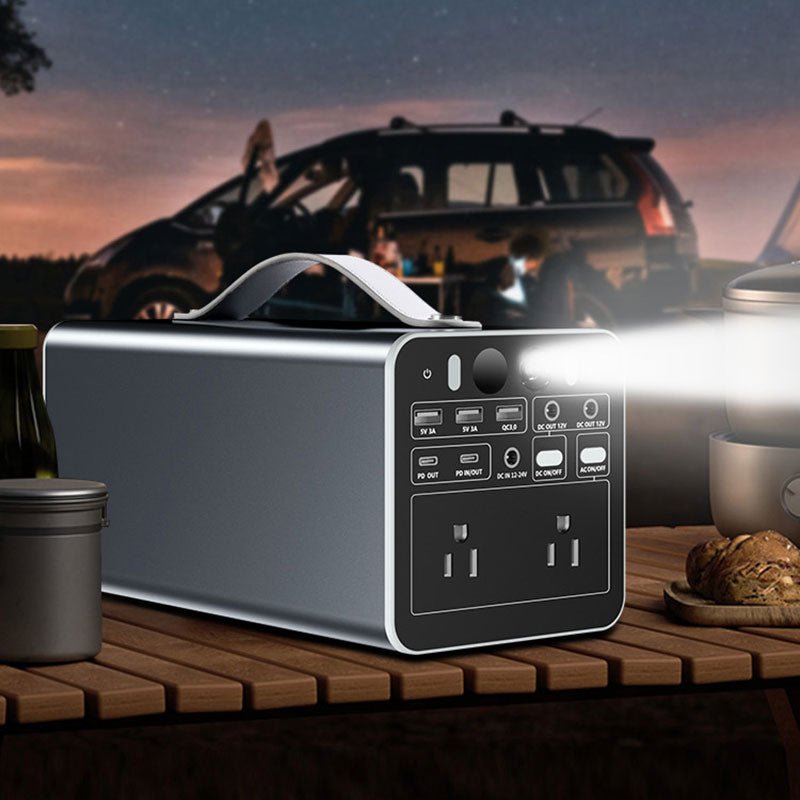In the heart of nature, where modern amenities are scarce, electricity becomes a luxury. But with the advancement of technology, we now have a solution that allows us to bring power with us wherever we go - portable solar generators. In this guide, we'll delve into the world of portable electric generators specifically tailored for camping trips. We'll explore the reasons behind choosing these generators, the different types available, tips for energy management while camping, compatibility with camping equipment, and essential technical support and after-sales service.
I. Why Choose a Portable Solar Generator for Camping?
In the tranquil wilderness, far from the bustling city lights, camping offers an escape into nature's embrace. But amidst this serenity, modern conveniences like electricity are often scarce. However, with a portable camping electricity generator by your side, you can enjoy the comforts of electricity even in the remotest of campsites.
1. Why is Electricity Essential for Camping?
Electricity has become an integral part of our daily lives, even more so during camping trips. It powers our lighting, charges our devices, runs essential appliances, and even keeps us entertained. Whether it's lighting up the campsite at night, charging your phone for emergencies, or powering a mini-fridge to keep your beverages cool, electricity enhances the camping experience in myriad ways.
2. Advantages of Solar Generators Over Traditional Alternatives
While traditional generators have been a staple for powering campsites, portable solar generators offer several distinct advantages. Unlike their noisy and fuel-dependent counterparts, solar generators harness the sun's abundant energy, providing a clean, silent, and sustainable power source. Moreover, solar generators require minimal maintenance, produce no emissions, and operate silently, ensuring a peaceful camping experience without disturbing the tranquility of nature.
3. Real-World Benefits of Solar Generators in Outdoor Settings
The practical benefits of portable solar generators in outdoor settings are undeniable. They offer a reliable and renewable power source that is independent of fuel availability or grid connections. Whether you're embarking on a remote backpacking trip or setting up a base camp for an extended wilderness expedition, a solar generator ensures you have a steady supply of electricity for your essential needs. Moreover, by harnessing the sun's energy, solar generators contribute to reducing our carbon footprint and preserving the pristine beauty of nature for future generations.

II. Which Type of Portable Solar Generator is Suitable for Camping?
As you embark on your camping adventure, choosing the right type of portable solar generator is crucial to ensure you have sufficient power to meet your needs without compromising on portability or efficiency.
1. Foldable vs. Fixed Solar Panels: Understanding the Difference
Foldable and fixed solar panel kit are the two primary types of solar panels used in portable solar generators. Foldable panels are typically made of flexible materials and can be easily folded or rolled up for compact storage and transportation. On the other hand, fixed panels are rigid and permanently attached to the generator's housing.
Foldable panels offer greater flexibility in positioning and orientation, allowing you to adjust them to capture the maximum amount of sunlight throughout the day. They are ideal for campers who value portability and versatility. Fixed panels, while less flexible, are often more durable and weather-resistant, making them suitable for long-term or semi-permanent installations.
2. Battery Capacity and Output Power: Matching Your Camping Needs
When selecting a portable solar generator for camping, it's essential to consider both the battery capacity and the output power. The battery capacity determines how much energy the generator can store, while the output power dictates how much power it can deliver at any given time.
For camping trips, opt for a generator with a battery capacity that matches your energy consumption requirements. Consider factors such as the number of devices you need to charge, the duration of your trip, and the availability of sunlight in your camping area. Additionally, ensure that the generator's output power is sufficient to run your essential devices and appliances without overloading the system.
3. Finding the Balance Between Size and Weight for Portability
Portability is a key consideration when choosing a portable solar generator for camping. While you want a generator that is powerful enough to meet your energy needs, you also don't want it to be overly bulky or heavy, making it difficult to transport to your campsite.
Finding the right balance between size and weight is essential. Look for generators that offer a compact and lightweight design without compromising on performance. Consider the dimensions and weight of the solar generator, as well as any additional accessories or carrying cases that may add to its overall bulk. A portable solar generator that strikes the perfect balance between size and weight will ensure that you can easily transport it to your campsite without any hassle.
III. Energy Management Tips for Camping
Managing energy efficiently during your camping trip is essential to ensure that you make the most of your portable solar generator's capabilities while prolonging its battery life.
1. Choosing Energy-Efficient Camping Equipment
Opting for energy-efficient camping equipment can significantly reduce your energy consumption and prolong the runtime of your portable solar generator. Look for LED lanterns, flashlights, and camping lights, which consume less power than traditional incandescent bulbs. Similarly, invest in low-power appliances such as mini-fridges, fans, and chargers that are designed to operate efficiently on limited power sources.
2. Optimizing Solar Panel Placement for Maximum Sunlight Exposure
The effectiveness of your portable solar generator relies heavily on the placement and orientation of the solar panels. To maximize sunlight exposure, position your solar panels in a location where they can receive direct sunlight for the majority of the day. Avoid shading from trees, buildings, or other obstructions that may hinder the panels' ability to capture sunlight. Additionally, consider adjusting the tilt angle of the panels throughout the day to optimize solar absorption, especially during the morning and afternoon hours when the sun's angle changes.
3. Enhancing Charging Efficiency with Solar Panel Accessories
Investing in solar panel accessories can further enhance the charging efficiency of your portable solar generator. Consider purchasing solar panel extension cables, tilt mounts, or portable solar panel stands to increase flexibility in panel placement and improve sunlight exposure. Additionally, using a solar charge controller can regulate the charging process, prevent overcharging, and optimize battery performance, ensuring that your generator operates at peak efficiency throughout your camping trip.
By implementing these energy management tips, you can maximize the performance of your portable solar generator while minimizing energy waste, allowing you to enjoy uninterrupted power during your outdoor adventures.
IV. Compatibility of Solar Generators with Camping Equipment
Ensuring compatibility between your portable solar generator and camping equipment is essential for a seamless and hassle-free camping experience.
1. Assessing the Compatibility of Camping Equipment
Before setting out on your camping trip, it's crucial to assess the compatibility of your camping equipment with your portable solar generator. Consider the power requirements of each device or appliance you plan to bring and ensure that they fall within the output capabilities of your generator. Pay special attention to high-power devices such as portable refrigerators, heaters, or power tools, as they may require a generator with higher output capacity to operate effectively.
2. Choosing the Right Charging Adapters and Cables
Having the right charging adapters and cables is essential for connecting your camping equipment to your portable solar generator. Make sure to check the compatibility of the connectors and ports on both your generator and your devices to ensure a proper fit. Additionally, consider investing in universal charging adapters or multi-port USB hubs to accommodate various devices simultaneously and streamline the charging process.
3. Utilizing Battery Storage Systems for Extended Power Availability
To extend the availability of power during your camping trip, consider utilizing battery storage systems in conjunction with your portable solar generator. Portable power stations or battery packs can store excess energy generated by your solar panels during the day and provide backup power during periods of low sunlight or overnight. This ensures that you have a reliable power source to keep your essential devices charged and operational even when the sun isn't shining.
By ensuring compatibility between your portable solar generator and camping equipment, you can enjoy a stress-free camping experience with uninterrupted access to power for all your needs.
V. Technical Support and After-Sales Service
Having access to reliable technical support and after-sales service is crucial for ensuring the optimal performance and longevity of your portable solar generator.
1. Troubleshooting Common Issues with Solar Generators
Despite their simplicity, portable solar generators may encounter occasional issues that require troubleshooting. Familiarize yourself with common problems such as poor charging performance, battery degradation, or malfunctioning components, and learn how to address them effectively. Refer to the user manual provided with your generator for troubleshooting guidelines, or seek assistance from the manufacturer's customer support team for personalized troubleshooting assistance.
2. Warranty Coverage and Repair Services
Before purchasing a portable solar generator, carefully review the warranty coverage offered by the manufacturer. A comprehensive warranty should cover defects in materials and workmanship, as well as provide repair or replacement services in the event of a malfunction. Additionally, inquire about the availability of repair services and authorized service centers in your area to ensure prompt resolution of any issues that may arise during the warranty period.
3. Leveraging Online Communities for Support and Advice
Online communities and forums dedicated to camping and renewable energy can be valuable resources for troubleshooting tips, product recommendations, and general advice on solar generator maintenance. Engage with fellow campers and renewable energy enthusiasts to share experiences, seek advice, and stay updated on the latest developments in portable solar technology. These communities can provide invaluable support and guidance throughout your camping journey, helping you make the most of your portable solar generator.
By leveraging technical support resources, warranty coverage, and online communities, you can ensure that your portable solar generator remains in optimal condition and continues to meet your camping needs for years to come.







